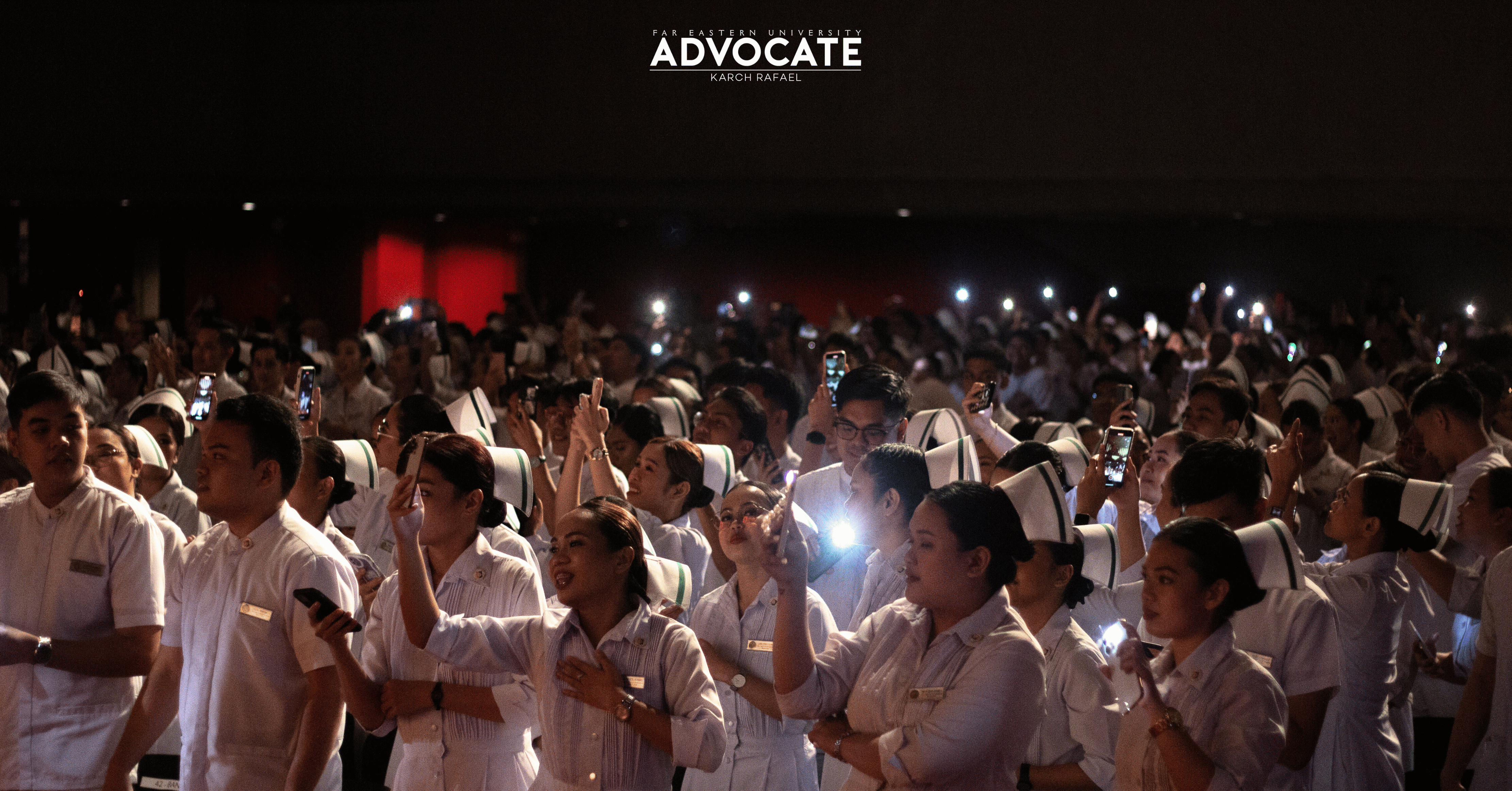
Likhang Mulat best short film relives Martial Law, resists history revisionism
- December 16, 2023 03:10
FEU Advocate
April 26, 2024 08:50

By Mark Vincent A. Durano and Eunhice Corpuz
Olive trees flourished in the humble orchards of Palestine not just as a source of income but as companions of life. It bears the fruit gripping on to each family’s identity and upbringing--including Filipino-Palestinians. So when the olive trees were cut and burnt by Israel, an olive tree continued to sprout within the spirit of the Filipino-Palestinian families who lived and established a new life in ‘Little Gaza’ in Don Antonio Village, Quezon City.
Currently, 69 individuals and 16 families reside in the four-story flat embracing the memories of Palestine after seeking refuge from the war.
Now away from the proximate Muslim traditions, the families have made joint efforts to bring the culinary scene of Palestine to the humble walls of their new community.
Throughout their stay, the refugees have brought the warmth and spice of Palestinian cuisine to Filipinos in a pop-up food bazaar called ‘Little Gaza’s Kitchen’ held in Don Antonio last Ramadan and in Quezon City Memorial Circle last Eid’l Fitr marking the last day of Ramadan.
Little Gaza’s Kitchen also participated in the 2024 Halal-Friendly Quezon City Trade Fair at the Risen Garden in Quezon City Hall from April 24 to 25.
People who visited the bazaar reacted to the event in a positive light, contrary to what the families expected. Each of the food they prepared got sold out with guests hailing from all walks of life, including Christians.
From rice dishes like Kabsa and Biryani to desserts like Awama and Basbousa, their stories permeated the taste of Gaza in every bite.
The Moro-Palestinians Cooperation Team proposed the idea of a food business to introduce what kind of life the families lived in Gaza.
“The pop-up bazaar of the Palestinians is a showcase of mixed culture and tradition of Filipino-Palestinian and also observance of the Islamic faith,” one of the organizers Nords Maguindanao said in an interview with FEU Advocate.
The management also plans to acclimate Little Gaza to the food industry as a potential livelihood opportunity.
When life redirects a new path, it keeps one’s faith toward a promising journey, but there is a different story to tell for 63-year-old Revelina al Abadl and her family.
She recalled their torment in navigating the road leading to the border of Egypt from her house in Gaza.
“[Noong] kami ay umalis ng Gaza, November 13, so pang-[third] batch kami... There [was] no gasoline [so] what we do ‘yung gas stove kinuha namin, ‘yun ang kinabit dun sa car na maghahatid sa border. Tapos ‘yung mga dala-dala namin ‘yung mga papers namin--passport (When we left Gaza last November 13 we were the third batch... There was no gasoline available so what we did was to get the gas stove and then attach it to the car that would take us to the border. The paper we have with us was our passport),” Revelina said.
However, the journey they experienced was barely the beginning of their misery.
“Pero hindi rin namin nakuha lahat kasi kasalukuyan nu’ng kami ay nag-evacuate na malapit sa amin ‘yung bomba kaya nagmadali kami tapos, Alhamdulillah, at least nakarating naman kami ng border (but we didn’t get everything because while we were evacuating the bomb was near us so we quickly retrieved, and praise be to Allah, we reached the border),” she added.
A day later, they arrived in the Philippines but sudden, life-changing events happened. For Revelina, despite escaping the horrors, it gave them a new turning point where the bittersweet emotion lingers in the death of her son, a month after they arrived.
“Nagpasalamat pa rin kami, at least naka-evacuate kami at ‘yung anak ko. Kasi ‘yung iba du’n pag namatay na du’n sa Gaza ‘di na pwedeng lapitan ‘yung patay at least, Alhamdulillah, ‘yung anak ko dito namatay nailibing namin nang maayos (We are still thankful because at least we were evacuated together with my children. Because when they die in Gaza, you cannot go near them, which is why at least, praise be to Allah, my son was properly buried)," she said mourning for her bereaved child.
Out of all the atrocities and destruction of their properties, they remain grateful to have evacuated alive.
Additionally, 59-year-old Zenith Soria Abu Dalal shared the path they had upon crossing the Egypt border.
“It's very hard. My experience is that for my family, I was trapped. I live in the middle of Gaza and the city of Gaza; now I have to go to the border near Egypt to get out of Gaza, but [at] that time the road from Gaza City to the border was closed,” Zenith said.
They had to carry only two pairs of clothes, important documents, and a bottle of water while walking for around eight to 10 km but the border was only open from 10 a.m. to 2 p.m. They also held a white flag so the Israeli soldiers would not shoot them.
The Philippine Embassy waited at the border and guided them to Egypt. However, some Palestinians were not given a permit to cross the border due to lacking documents such as foreign passports.
Alongside the successful evacuation, they faced an issue when her husband’s name was not on the list but managed to pass with help from the embassy.
Withstanding the predicaments, they remained firm, leading to a new direction where they could have a clean slate of fresh air but left the decades of hard work that Israel blasted into shattered tears.
The families struggled to treat the Philippines as a home when they had nothing--even a house. In the story of Revelina and Zenith’s fate, they unfold a chapter about how they ended up living in one community.
Zenith realized that she had a big family, including her in-laws, grandchildren, and children; hence, it would be a dilemma to accommodate them by their siblings and relatives here in the country.
“So, meron akong kamag-anak sa Lipa, sabi niya, 'Halika, ante. Pagkasyahin natin kung anong mero’n dito.' So, du’n ako pumunta. ‘Yung iba, napunta sila sa UP [University of the Philippines], ‘yung iba napunta sa Cavite, ‘yung iba... kung saan-saan na napunta sa ibang provinces--ganun ang nangyari (So, I have a relative in Lipa, he said, 'Come, auntie. Let's fit what's available here.' So, I went there. The others went to UP, the others went to Cavite, and a few of them went to other provinces--that is what happened)," she added.
In February this year, they moved into one building with the same people they knew back in Gaza.
“We are in one place. Masaya ako (I am happy), I feel at home. I feel na, (that), as if I’m still in Gaza. Parang (Like) I don’t forget what I left there in Gaza because nakikita ko (I see) the same people that I saw there in Gaza,” Zenith reminisced.
It was the people around her that mattered more, which made their “little” community beautiful in light of the stress of sustaining their own necessities and requirements.
However, being here in the country still makes Revelina anxious about the ongoing war in Gaza as they feel the distress and pain of the victims whenever they hear stories, news reports, and social media posts.
Above all, they still dared to survive and fight for their lives as they opened a new chapter. For them, this is the chapter that crosses another border and tries to cope with trauma amidst the bloodshed.
According to the refugees, the rescued families were supposed to receive P200,000 financial assistance directly from the Malacañang but only the first batch of families to arrive in the country received it last December.
Four months have passed and given the circumstances that the government failed to dole the subsidy, their hopes to get back on track lie only within themselves.
This leaves the refugees with nothing but to burn gasoline and walk their path toward the border--the border that draws the line behind their lives. They had to take action and not depend on others’ donations.
Even if the government has urged the refugees to contact their families, which are mostly in provinces, rural life would be unbearable on top of cultural differences.
“Kaya minsan kung maaari nga lang eh...Kaso lang mahirap, [sa] probinsya, nagtataniman lang sila. Tapos kanya-kanyang bahay, may big families sila. Wala naman akong tatay at nanay, wala naman silang naiwan na bahay (If it is just really fine... But it is hard, [in the] province, they are just farming. Then they have their own house, they have big families. I do not have a father and mother, they did not leave me a house),” Revelina expressed.
Moreover, they said the Department of Social Welfare and Development supplied some of their homeware in Don Antonio.
The only goal of the Philippine Embassy was to save them from Gaza in which providing shelter was not a priority, adding another problem for the families.
“Sabihin mo naman na maghanap kami for rental, [pero] wala kaming mga dalang pera to rent. Ang mahal ng mga rental dito sa Pilipinas (You can tell us to look for rent, [but] we do not have money to rent. The rents here in the Philippines are expensive),” Zenith said.
On the borderline of surviving, the Filipino-Palestinian families persist in being the survivors of trauma. All they could hope for was to let the olive trees sprout again and the bombing of Israel cease its rage. Per se, they still believe they can see their beautiful country once again and restart the life they once had. ‘Til then, from the river to the sea, Palestine will surely be free.
(Photo by Mark Vincent A. Durano/FEU Advocate)









